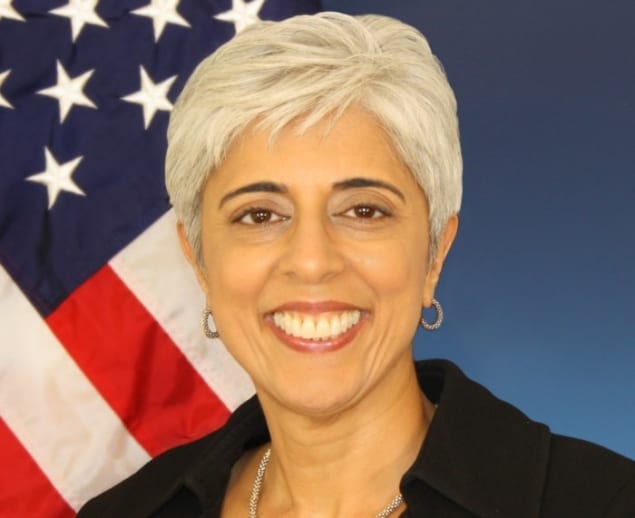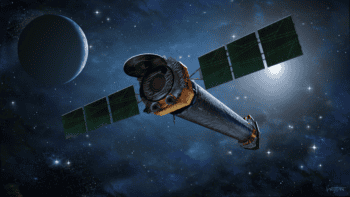
The applied physicist Arati Prabhakar has been nominated by US president Joe Biden as the next director of the Office of Science and Technology Policy (OSTP). If approved by the US Senate, the 63-year-old would become the first woman – and the first immigrant and person of colour – to take up this key role in US science. Biden has also announced that Prabhakar will become US science adviser and will join the president’s cabinet.
Prabhakar, who was born in India but moved to the US when she was three years old, already has other significant firsts to her name. In 1984 she became the first woman to receive a PhD in applied physics from the California Institute of Technology. Following a stint at the Defense Advanced Research Projects Agency (DARPA), at 34 she became the first female director of the National Institute of Standards and Technology (NIST), a position she held from 1993 to 1997.
Prabhakar also has experience in industry, having served as chief technology officer and senior vice president of Raychem from 1997–1998. She then worked as a venture capitalist for US Ventures – a firm in Menlo Park, California, that supports information technology start-ups. And from 2012 to 2017, Prabhakar served as DARPA director, where she expanded the agency’s focus on life science and medicine.
‘Uniquely qualified’
Prabhakar’s appointment as US science adviser follows the departure of the mathematician and geneticist Eric Lander, Biden’s first science adviser and OSTP director. Lander resigned in February from both roles after an investigation found “credible evidence” that he had mistreated and demeaned OSTP staff.
Biden then appointed Francis Collins, a former head of the National Institutes of Health, as science adviser, while sociologist Alondra Nelson took up the OSTP directorship – controversially splitting the science adviser and OSTP director roles between two people when it had traditionally been held by one person. Nelson will resume her previous role as deputy director of OSTP’s science and society team once Prabhakar is confirmed.
I hope the [Senate] committee receives many letters urging quick confirmation. In my view the situation is urgent.
Neal Lane
“[Prabhakar is] a brilliant and highly respected engineer and applied physicist and will lead the [OSTP] to leverage science, technology, and innovation to expand our possibilities, solve our toughest challenges, and make the impossible possible,” says Biden.
Members of the scientific community echoed those sentiments. “Her record of excellence and innovation will be an asset to the agency,” says Deborah Cooper, the current president of IEEE-USA, which represents more than 150,000 professionals in engineering, computing, and technology. Eric Lander resignation leads to controversial split of US presidential science adviser role
Former presidential science adviser Neal Lane and Norman Augustine, retired chair and chief executive of Lockheed, note in a joint letter to Congressional leaders that Prabhakar is “uniquely qualified” to lead the OSTP. “Issues such as international competitiveness, climate change, a clean energy future, and advanced health research all require the kind of leadership and experience Prabhakar can provide,” they add.
Lane now calls for Prabhakar’s nomination to be prioritized. “I hope the [Senate] committee receives many letters urging quick confirmation,” he told Physics World. “In my view the situation is urgent.”
Analysis: Prabhakar faces multiple challenges as she takes up US science adviser role
In a 2020 interview with the American Institute of Physics’ Center for History of Physics, Arati Prabhakar expressed her preference for engineering over academic research. “Science’s verbs are ‘know’ and ‘understand’. Those are not my verbs,” she said. “Yes, let’s know and understand, but I want to do engineering’s verbs, which are ‘solve’ and ‘create’.”
That “solutions” approach will help Prabhakar as she becomes US science adviser and head of the presidential Office of Science and Technology Policy (OSTP). Those roles have gained more than the usual significance owing to the pandemic, the Russian invasion of Ukraine as well as the looming threat of China to the US’s dominance in science and technology.
Indeed, the five months since Eric Lander’s resignation as head of the OSTP haven’t changed Prabhakar’s in-tray of tasks. Biden had asked Lander to use lessons from the pandemic to improve public health; to enlist researchers in the struggle against climate change; to maintain US leadership in key technologies; to reduce inequality; and to convert government-funded research into jobs and products.
And there may not be currently a better candidate to tackle those issues. The Center for American Progress (CAP) – an independent policy institute – calls Prabhakar “the ideal leader” for the OSTP and with a background well suited for the presidential science adviser role. “Her work across the private sector, nonprofits, and government equips her for cross-cutting challenges, at a moment when the rigorous work of fact-based policymaking is more critical than ever and the governance of tech platforms so clearly affects the fragility of US democracy,” CAP director Patrick Gaspard noted in a statement.



